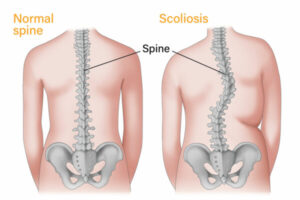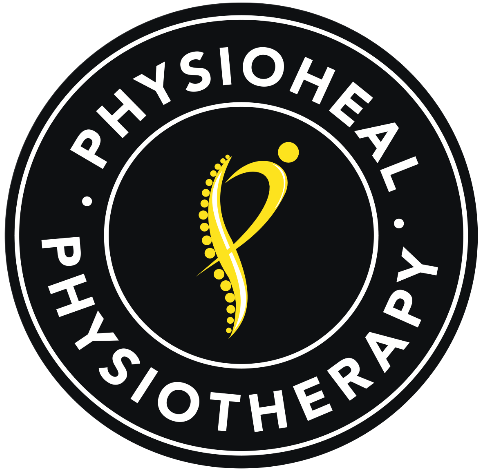We Are Open For Scoliosis Treatment in Gurgaon!
Fill the form and let us call you back.
[gravityform id="3" title="false" description="false"]
Comprehensive Scoliosis Management and Effective Physiotherapy Treatment
Explore our in-depth guide to Scoliosis, an abnormal lateral curvature of the spine, and discover how Physioheal Physiotherapy in Gurgaon offers specialized solutions for effective treatment and rehabilitation. Led by expert physiotherapist Dr. Divya Gaur, our team is dedicated to providing holistic care that enhances the quality of life for individuals affected by Scoliosis.
Understanding Scoliosis
Scoliosis presents as an irregular sideways curvature of the spine and is frequently diagnosed during childhood or early adolescence. The spine’s typical curves occur in the cervical, thoracic, and lumbar regions, functioning as shock absorbers while maintaining head-to-pelvis alignment. However, Scoliosis involves a more complex three-dimensional issue that spans the coronal, sagittal, and axial planes.

Exploring the Three Dimensions of Scoliosis
- Coronal Plane: This vertical plane divides the body into front and back sections. Scoliosis is quantified by the Cobb’s angle of spine curvature in this plane and often coincides with vertebral rotation in the transverse plane and hypokyphosis in the sagittal plane.
- Sagittal Plane: Separating the body into right and left halves, this plane is crucial in understanding the spine’s natural curves and functional dynamics.
- Axial Plane: Positioned parallel to the ground and perpendicular to the coronal and sagittal planes, the axial plane contributes to a comprehensive understanding of scoliosis.
Exploring Scoliosis Types and Etiologies
Scoliosis manifests in different forms, each with its own etiology:
- Idiopathic Scoliosis: This is the most common form, affecting 2-3% of the population. While its cause remains unknown, it is typically diagnosed during puberty. Idiopathic scoliosis is further categorized into infantile, juvenile, and adolescent types, each with unique characteristics and treatment requirements.
- Congenital Scoliosis: Arising from embryological vertebrae malformation, this type is detected at a younger age compared to idiopathic scoliosis. It requires careful evaluation and tailored intervention.
- Neuromuscular Scoliosis: Linked to neurological or muscular conditions like cerebral palsy and muscular dystrophy, this type often progresses more rapidly and may necessitate surgical intervention.
Symptoms of Scoliosis
There are several signs that may indicate the possibility of scoliosis.
- Sideways curvature of the spine
- Sideways body posture
- One shoulder raised higher than the other
- Clothes not hanging properly
- Local muscular aches
- Local ligament pain
- Decreasing pulmonary function, major concern in progressive severe scoliosis.
Recognizing the Signs and Seeking Diagnosis
Identifying scoliosis is crucial for timely intervention. Common signs include sideways curvature, uneven shoulder height, altered posture, and discomfort. Diagnosis involves a comprehensive approach, including physical examination, X-rays, CT scans, and MRI. Accurate assessment guides the formulation of an effective treatment plan.
Empowering Treatment Through Physiotherapy
At Physioheal Physiotherapy, we offer a holistic approach to scoliosis management, including:
- Conservative Treatment: Our conservative approach emphasizes exercises, bracing, manipulation, and therapeutic modalities. Tailored to each individual’s needs, this approach aims to enhance posture, muscle balance, and overall well-being.
- Surgical Treatment: In cases of severe scoliosis, surgery may be recommended to reduce curvature severity. Our experts collaborate with renowned surgeons to provide comprehensive care.
- Physical Therapy Management: Our multidimensional approach integrates exercises, posture correction, and functional activity improvement. Hydrotherapy complements our physical therapy support, offering a well-rounded treatment experience.
The aims of physical therapy are:
- Autocorrection 3D
- Coordination
- Equilibrium
- Ergonomical corrections
- Muscular endurance/ strength
- Neuromotor control of the spine
- Increase of ROM
- Respiratory capacity/ education
- Side-shift
- Stabilization
Physiotherapy may involve
- Exercises to strengthen the supporting muscles of the spine and correct muscle imbalance.
- Correcting and varying posture and advice on positioning to reduce pain and increase comfort.
- Muscle stretching to lengthen tight muscles and relieve pain.
- Exercises based around functional activities to enhance independence at home or at school.
- Hydrotherapy treatment.
At Physioheal Physiothrapy in Gurgaon, we provide comprehensive assessment and treatment for children following spinal surgery. It is important to commence physiotherapy treatment as soon as possible following the surgery for the best possible recovery. Our pediatric physiotherapist Dr Divya Gaur at Physioheal Physiothrapy in Gurgaon will help rebuild your child’s strength and flexibility and improve posture in a safe and effective way so they can continue with the activities they enjoy at home or at school.
Physiotherapy treatment will be focused on:
- Relieving pain and swelling
- Restoring and maintaining range of movement
- Increasing muscle strength
- Improving posture
- Increasing comfort
- Enhancing independence with everyday activities
- Improving quality of life
Our best paediatric physiotherapist is experienced at treating children and adolescents following spinal surgery. An initial assessment with one of our physiotherapists will look at your child’s movement and current symptoms and a structured rehabilitation program will be developed suited to your child which may involve:
- Ice application to relive pain in the initial stages of recovery.
- Advice about certain positions of the spine and movement while your child’s back is still healing.
- Stretching exercises to improve flexibility of the lower back, trunk and neck and reduce pain.
- Range of movement exercises such as bending, straightening and rotating the back.
- Exercises to strengthen the core muscles which will be fun and tailored to your child.
- Hydrotherapy once the wound has healed.
Physiotherapy will help maximise your child’s physical potential following surgery and increase independence with the activities at school or home. If you are looking for Scoliosis treatment in Gurgaon then consult our best physiotherapist Dr. Divya Gaur. Our specialised physiotherapists at Physioheal Physiothrapy in Gurgaon will help identify the appropriate resources, aids, equipment and support. To book an appointment call +91-9999259307, book online or alternatively request a phone consultation.
